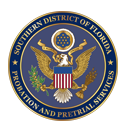Mental Health Treatment, which includes such services as psychological/psychiatric evaluations; individual, or family counseling; and medication, is provided to persons who suffer from mental health problems. These persons either are under pretrial supervision while awaiting a court appearance; on probation; or on parole or supervised release after serving time in prison. Treatment is ordered either by the U.S. District Court or the U.S. Parole Commission as a condition of releasing them to the community.
Mental health treatment helps defendants and offenders in many ways. It helps them address issues that may have led to their problems with the law. More importantly, it puts in motion strategies aimed at stabilizing them so that they do not present a danger to themselves or others. Thus, treatment serves to maximize public safety and the individual's potential for living and functioning effectively in the community.
What is Mental Illness: Mental Illness Facts
According to the National Alliance on Mental Illness, mental illnesses are medical conditions that disrupt a person's thinking, feeling, mood, ability to relate to others and daily functioning. Just as diabetes is a disorder of the pancreas, mental illnesses are medical conditions that often result in a diminished capacity for coping with the ordinary demands of life. Serious mental illnesses include major depression, schizophrenia, bipolar disorder, obsessive compulsive disorder (OCD), panic disorder, post traumatic stress disorder (PTSD) and borderline personality disorder. The good news about mental illness is that recovery is possible.
Mental illnesses can affect persons of any age, race, religion, or income. Mental illnesses are not the result of personal weakness, lack of character or poor upbringing. Mental illnesses are treatable. Most people diagnosed with a serious mental illness can experience relief from their symptoms by actively participating in an individual treatment plan.
In addition to medication treatment, psychosocial treatment such as cognitive behavioral therapy, interpersonal therapy, peer support groups and other community services can also be components of a treatment plan and that assist with recovery.
RESOURCES
![]() National Mental Health Association
National Mental Health Association
![]() National Alliance on Mental Illness
National Alliance on Mental Illness
![]() National Institute of Mental Illness
National Institute of Mental Illness
![]() SAMHSA´s National Mental Health Infomration Center
SAMHSA´s National Mental Health Infomration Center
PRESCRIPTION DRUG ASSISTANCE PROGRAMS
